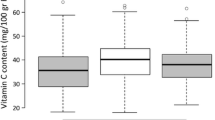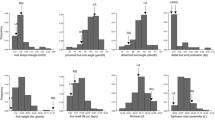Abstract
Key message
Reciprocal effects were found for tomato fruit quality and DNA methylation. The epigenetic identity of reciprocal hybrids indicates that DNA methylation might be one of the mechanisms involved in POEs.
Abstract
Crosses between different genotypes and even between different species are commonly used in plant breeding programs. Reciprocal hybrids are obtained by changing the cross direction (or the sexual role) of parental genotypes in a cross. Phenotypic differences between these hybrids constitute reciprocal effects (REs). The aim of this study was to evaluate phenotypic differences in tomato fruit traits and DNA methylation profiles in three inter- and intraspecific reciprocal crosses. REs were detected for 13 of the 16 fruit traits analyzed. The number of traits with REs was the lowest in the interspecific cross, whereas the highest was found in the cross between recombinant inbred lines (RILs) derived from the same interspecific cross. An extension of gene action analysis was proposed to incorporate parent-of-origin effects (POEs). Maternal and paternal dominance were found in four fruit traits. REs and paternal inheritance were found for epiloci located at coding and non-coding regions. The epigenetic identity displayed by the reciprocal hybrids accounts for the phenotypic differences among them, indicating that DNA methylation might be one of the mechanisms involved in POEs.




Similar content being viewed by others
Data availability
The datasets generated and analyzed in the study are available in the GenBank repository, https://www.ncbi.nlm.nih.gov/nucleotide/ and IDs are provided in the manuscript.
References
Adaay MH, ALabdaly MM (2019) Field performance, hybrid vigor and estimation of some of genetic parameters in tomato (Lycopersicon esculentum Mill.). Plant Archives 19:559–564
Allard RW, Jain SK, Workman PL (1968) The genetics of inbreeding populations. Adv Genet 14:55–131
Anderson S, Zynda G, Song J et al (2018) Subtle perturbations of the maize methylome reveal genes and transposons silenced by chromomethylase or RNA-directed DNA methylation pathways. G3 Genes Genomes Genetics 8:1921–1932. https://doi.org/10.1534/g3.118.200284
Bhattarai U, Talukdar P, Sharma A, Das R (2016) Combining ability and gene action studies for heat-tolerance physio-biochemical traits in tomato. Asian J Agric Res 10:99–106. https://doi.org/10.3923/ajar.2016.99.106
Cambiaso V, Gimenez M, Pereira da Costa J et al (2019) Selected genome regions for fruit weight and shelf life in tomato RILs discernible by markers based on genomic sequence information. Breeding Sci. https://doi.org/10.1270/jsbbs.19015
Cambiaso V, Rodríguez GR, Francis DM (2020) Propagation fidelity and kinship of tomato varieties ʻUC 82ʼ and ʻM82ʼ revealed by analysis of sequence variation. Agronomy 10:538
Cheverud J, Hager R, Roseman C et al (2008) Genomic imprinting effects on adult body composition in mice. P Natl Acad Sci USA 105:4253–4258. https://doi.org/10.1073/pnas.0706562105
Christians M, Gingerich D, Hansen M et al (2009) The BTB ubiquitin ligases ETO1, EOL1 and EOL2 act collectively to regulate ethylene biosynthesis in Arabidopsis by controlling type-2 ACC synthase levels. Plant J 57:332–345. https://doi.org/10.1111/j.1365-313x.2008.03693.x
Di Giacomo M, Luciani MD, Cambiaso V et al (2020) Tomato near isogenic lines to unravel the genetic diversity of S. pimpinellifolium LA0722 on fruit quality and shelf life breeding. Euphytica 216:126. https://doi.org/10.1007/s10681-020-02649-z
Di Rienzo JA, Casanoves F, Balzarini MG, et al (2017) InfoStat versión 2017. Grupo InfoStat, FCA, Universidad Nacional de Córdoba, Argentina. https://www.infostat.com.ar
Emani S, Nemati SH, Azizi M, Mobili M (2018) Combining ability and gene action of some tomato genotypes under low light condition. Adv Hort Sci 32:459–470. https://doi.org/10.13128/ahs-22479
Fan X, Zhang Y, Yao W et al (2014) Reciprocal diallel crosses impact combining ability, variance estimation, and heterotic group classification. Crop Sci 54:89. https://doi.org/10.2135/cropsci2013.06.0393
Fernandez-Pozo N, Menda N, Edwards J et al (2014) The Sol Genomics Network (SGN)-from genotype to phenotype to breeding. Nucleic Acids Res 43:D1036–D1041. https://doi.org/10.1093/nar/gku1195
Fulton T, Chunwongse J, Tanksley S (1995) Microprep protocol for extraction of DNA from tomato and other herbaceous plants. Plant Mol Biol Rep 13:207–209. https://doi.org/10.1007/bf02670897
Gallusci P, Hodgman C, Teyssier E, Seymour GB (2016) DNA methylation and chromatin regulation during fleshy fruit development and ripening. Front Plant Sci 7:807. https://doi.org/10.3389/fpls.2016.00807
García-Aguilar M, Gillmor C (2015) Zygotic genome activation and imprinting: parent-of-origin gene regulation in plant embryogenesis. Curr Opin Plant Biol 27:29–35. https://doi.org/10.1016/j.pbi.2015.05.020
Gayon J (2016) From mendel to epigenetics: history of genetics. C R Biol 339:225–230. https://doi.org/10.1016/j.crvi.2016.05.009
Gayosso-Barragán O, López-Benítez A, Rodríguez-Herrera SA, Ek-Maas JN, Hidalgo-Ramos DM, Alcala-Rica JSGJ (2019) Studies on combining ability in tomato (Solanum lycopersicum L.). Agronomy Res 17:77–85. https://doi.org/10.15159/AR.19.002
Ge X, Dietrich C, Matsuno M et al (2005) An Arabidopsis aspartic protease functions as an anti-cell-death component in reproduction and embryogenesis. Embo Rep 6:282–288. https://doi.org/10.1038/sj.embor.7400357
Gebhardt C (2016) The historical role of species from the Solanaceae plant family in genetic research. Theor Appl Genet 129:2281–2294. https://doi.org/10.1007/s00122-016-2804-1
Greiner S, Sobanski J, Bock R (2015) Why are most organelle genomes transmitted maternally? BioEssays 37:80–94. https://doi.org/10.1002/bies.201400110
Hager R, Cheverud J, Wolf J (2008) Maternal effects as the cause of parent-of-origin effects that mimic genomic imprinting. Genetics 178:1755–1762. https://doi.org/10.1534/genetics.107.080697
Hornslien K, Miller J, Grini P (2019) Regulation of parent-of-origin allelic expression in the endosperm. Plant Physiol 180:1498–1519. https://doi.org/10.1104/pp.19.00320
Hu Y, Rosa G, Gianola D (2016) Incorporating parent-of-origin effects in whole-genome prediction of complex traits. Genet Sel Evol 48:1–15. https://doi.org/10.1186/s12711-016-0213-1
Kearsey M, Pooni H (1996) The Genetical Analysis of Quantitative Traits. Springer
Kim HT, Lee JM (2018) Organellar genome analysis reveals endosymbiotic gene transfers in tomato. PLoS ONE 13(9):e0202279. https://doi.org/10.1371/journal.pone.0202279
Köhler C, Wolff P, Spillane C (2012) Epigenetic mechanisms underlying genomic imprinting in plants. Annu Rev Plant Biol 63:331–352. https://doi.org/10.1146/annurev-arplant-042811-105514
Laurin C, Cuellar-Partida G, Hemani G et al (2018) Partitioning phenotypic variance due to parent-of-origin effects using genomic relatedness matrices. Behav Genet 48:67–79. https://doi.org/10.1007/s10519-017-9880-0
Laviola B, Teodoro P, Peixoto L, Bhering L (2018) Parental selection in diallel crosses of Jatropha curcas using mixed models. Acta Sci Agronomy 40:35008. https://doi.org/10.4025/actasciagron.v40i1.35008
Li S, Wang X, Li J et al (2012) Bayesian mapping of genome-wide epistatic imprinted loci for quantitative traits. Theor Appl Genetics 124:1561–1571. https://doi.org/10.1007/s00122-012-1810-1
Lima VJ et al (2019) Combined dominance and additive gene effects in trait inheritance of drought-stressed and full irrigated popcorn. Agronomy 9:782. https://doi.org/10.3390/agronomy9120782
Lu Y, Yasuda S, Li X et al (2016) Characterization of ubiquitin ligase SlATL31 and proteomic analysis of 14-3-3 targets in tomato fruit tissue (Solanum lycopersicum L.). J Proteomics 143:254–264. https://doi.org/10.1016/j.jprot.2016.04.016
Mukherjee D, Maurya P, Banerjee S et al (2019) Breeding cherry tomato grown under open field conditions for simultaneous improvement in yield, nutritional quality, and leaf curl virus disease tolerance. Int J Veg Sci. https://doi.org/10.1080/19315260.2019.1663973
Murtagh F, Legendre P (2014) Ward’s hierarchical agglomerative clustering method: which algorithms implement ward’s criterion? J Classif 31:274–295. https://doi.org/10.1007/s00357-014-9161-z
Nagata N (2010) Mechanisms for independent cytoplasmic inheritance of mitochondria and plastids in angiosperms. J Plant Res 123:193–199. https://doi.org/10.1007/s10265-009-0293-x
Pereira da Costa JH, Rodríguez P et al (2014) Pericarp polypeptides and SRAP markers associated with fruit quality traits in an interspecific tomato backcross. Genet Mol Res 13:25392547. https://doi.org/10.4238/2014.January.24.10
Pereira da Costa J, Rodríguez GR, Liberatti DR et al (2016) Tomato second cycle hybrids as a source of genetic variability for fruit quality traits. Crop Breed Appl Biotechnol 16:289–297. https://doi.org/10.1590/1984-70332016v16n4a44
R Core Team (2020) R: a language and environment for statistical computing. R Foundation for Statistical Computing, Vienna. https://www.R-project.org/
Rajcan I, Kasha KJ, Kott LS, Beversdorf WD (2002) Evaluation of cytoplasmic effects on agronomic and seed quality traits in two doubled haploid populations of Brassica napus L. Euphytica 123:401–409. https://doi.org/10.1023/A:1015057923578
Raza M, Yu N, Wang D et al (2017) Differential DNA methylation and gene expression in reciprocal hybrids between Solanum lycopersicum and S. pimpinellifolium. DNA Res. https://doi.org/10.1093/dnares/dsx028
Remnant E, Ashe A, Young P et al (2016) Parent-of-origin effects on genome-wide DNA methylation in the Cape honey bee (Apis mellifera capensis) may be confounded by allele-specific methylation. BMC Genomics 17:1–14. https://doi.org/10.1186/s12864-016-2506-8
Rodrigues JA, Zilberman D (2015) Evolution and function of genomic imprinting in plants. Genes Dev 29:2517–2531. https://doi.org/10.1101/gad.269902.115
Rodríguez GR, Pratta G, Zorzoli R, Picardi LA (2006) Recombinant lines obtained from an interspecific cross between lycopersicon species selected by fruit weight and fruit shelf life. J Amer Soc Hort Sci 131:651–656
Rodríguez G, Pratta G, Liberatti D et al (2010) Inheritance of shelf life and other quality traits of tomato fruit estimated from F1’s, F2’s and backcross generations derived from standard cultivar, nor homozygote and wild cherry tomato. Euphytica 176:137–147. https://doi.org/10.1007/s10681-010-0241-9
Rodríguez GR, Muños S, Anderson C et al (2011) Distribution of SUN, OVATE, LC, and FAS in the tomato germplasm and the relationship to fruit shape diversity. Plant Physiol 156:275–285. https://doi.org/10.1104/pp.110.167577
Romanus K, Hussein S, Mashela W (2008) Combining ability analysis and association of yield and yield components among selected cowpea lines. Euphytica 162:205–210. https://doi.org/10.1007/s10681-007-9512-5
Santure A, Spencer H (2006) Influence of mom and dad: Quantitative genetic models for maternal effects and genomic imprinting. Genetics 173:2297–2316. https://doi.org/10.1534/genetics.105.049494
Satyaki PRV, Gehring M (2017) DNA methylation and imprinting in plants: machinery and mechanisms. Crit Rev Biochem Mol. https://doi.org/10.1080/10409238.2017.1279119
Schacherer J (2016) Beyond the simplicity of Mendelian inheritance. C R Biol 339:284–288. https://doi.org/10.1016/j.crvi.2016.04.006
Shapiro SS, Wilk MB (1965) An analysis of variance test for normality (complete samples). Biometrika 52:591–611
Shen J, Dirks R, Havey M (2015) Diallel Crossing among doubled haploids of cucumber reveals significant reciprocal-cross differences. J Am Soc Hortic Sci 140:178–182. https://doi.org/10.21273/jashs.140.2.178
Shi H, Zhang Y (2014) Pear 14–3-3a gene (Pp14-3-3a) is regulated during fruit ripening and senescense, and involved in response to salicylic acid and ethylene signalling. J Genet 93:747–753. https://doi.org/10.1007/s12041-014-0447-z
Tasisa J, Mohammed W, Hussien S, Kumar V (2018) Genetic control of inheritance of fruit quality attributes in tomato (Solanum lycopersicum). Agr Res 7:120–128. https://doi.org/10.1007/s40003-018-0314-x
Vijeth S, Dhaliwal MS, Jindal SK, Garg N, Kaushik P, Sharma A (2019) Diallel analysis of elite tomato lines comprising leaf curl virus resistance genes. Appl Ecol Env Res. https://doi.org/10.15666/aeer/1703_64576471
Wang K, Yoshida H, Lurin C, Ecker J (2004) Regulation of ethylene gas biosynthesis by the Arabidopsis ETO1 protein. Nature 428:945–950. https://doi.org/10.1038/nature02516
Wolf J, Cheverud J (2009) A framework for detecting and characterizing genetic background-dependent imprinting effects. Mammalian Genome Official J Int Mammalian Genome Soc 20:681–698. https://doi.org/10.1007/s00335-009-9209-2
Wolf J, Wade M (2016) Evolutionary genetics of maternal effects. Evolution 70:827–839. https://doi.org/10.1111/evo.12905
Wu Z (2016) The completed eight chloroplast genomes of tomato from Solanum genus. Mitochondrial DNA Part: A DNA Mapp Seq Anal 27:4155–4157. https://doi.org/10.3109/19401736.2014.1003890
Xiong Xu, Maroof S, Zhang Q (1999) Patterns of cytosine methylation in an elite rice hybrid and its parental lines, detected by a methylation-sensitive amplification polymorphism technique. Mol Gen Genetics Mgg 261:439–446. https://doi.org/10.1007/s004380050986
Xu Y, Zhong L, Wu X et al (2009) Rapid alterations of gene expression and cytosine methylation in newly synthesized Brassica napus allopolyploids. Planta 229:471–483. https://doi.org/10.1007/s00425-008-0844-8
Yoshida H, Nagata M, Saito K et al (2005) Arabidopsis ETO1 specifically interacts with and negatively regulates type 2 1-aminocyclopropane-1-carboxylate synthases. Bmc Plant Biol 5:14. https://doi.org/10.1186/1471-2229-5-14
Zhang Q, Liu Y (2003) Examination of the cytoplasmic DNA in male reproductive cells to determine the potential for cytoplasmic inheritance in 295 angiosperm species. Plant Cell Physiol 44:941–951. https://doi.org/10.1093/pcp/pcg121
Zhong S, Fei Z, Chen Y-RR et al (2013) Single-base resolution methylomes of tomato fruit development reveal epigenome modifications associated with ripening. Nat Biotechnol 31:154–159. https://doi.org/10.1038/nbt.2462
Acknowledgements
We thank the Tomato Genetic Resources Center, University of California, Davis, California, USA for kindly providing seeds of the wild accession LA0722 of S. pimpinellifolium and Estación Experimental Agropecuaria—Instituto Nacional de Tecnología Agropecuaria Cerrillos, Salta, Argentina for kindly providing seeds of the ‘Caimanta’ cultivar. We thank Dra. Liliana Picardi for her valuable comments. We thank Gabriela Venturi for her careful revision of the English manuscript and valuable comments.
Funding
This work was supported by the Agencia Nacional de Promoción Científica y Tecnológica (FONCyT PICT 2015-0424), Consejo Nacional de Investigaciones Científicas y Técnicas (CONICET PIP2015-008 and PUE0043), and Universidad Nacional de Rosario (PID UNR AGR 247).
Author information
Authors and Affiliations
Contributions
MDG conceptualization, investigation, methodology, formal analysis, writing—original draft. DVV investigation, formal analysis, writing—review and editing. FT investigation, formal analysis, writing—review and editing. VC formal analysis, writing—review and editing. GRR conceptualization, investigation, methodology, formal analysis, funding acquisition, writing—original draft.
Corresponding author
Ethics declarations
Conflict of interest
The authors declare that there is no conflict of interest.
Consent for publication
All authors give their consent for publication.
Additional information
Communicated by Neal Stewart.
Publisher's Note
Springer Nature remains neutral with regard to jurisdictional claims in published maps and institutional affiliations.
Electronic supplementary material
Below is the link to the electronic supplementary material.
Rights and permissions
About this article
Cite this article
Gimenez, M.D., Vazquez, D.V., Trepat, F. et al. Fruit quality and DNA methylation are affected by parental order in reciprocal crosses of tomato. Plant Cell Rep 40, 171–186 (2021). https://doi.org/10.1007/s00299-020-02624-x
Received:
Accepted:
Published:
Issue Date:
DOI: https://doi.org/10.1007/s00299-020-02624-x




